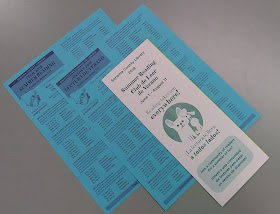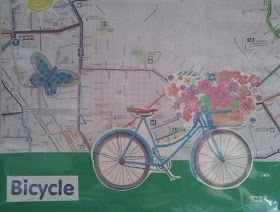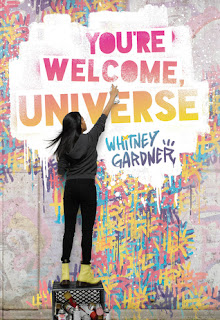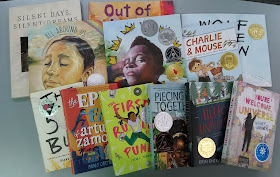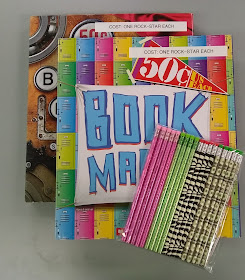Pages
▼
Thursday, May 31, 2018
Summer Reading at Sonoma County Library
School is out, and Summer Reading begins tomorrow at Sonoma County Library. Kathy DeWeese with SCL brought brochures and fliers to me in the library at Santa Rosa Charter School for the Arts; I distributed them to homeroom teachers to send home with their students.
Sunday, May 27, 2018
‘Piecing Me Together’ by Renée Watson
Jade has been awarded a place in a program that pairs young Black girls with older mentors.
The program includes a college scholarship if Jade successfully completes the program; this opportunity is the overwhelming factor that convinces Jade to join — because what Jade really wants, what she desperately seeks, is the type of opportunity that allows her to help other people.
“Why am I only seen as someone who needs and not someone who can give?” This question, posed by Jade, is at the heart of Piecing Me Together.
Renée Watson’s book is among recent winners and honorees of the American Library Association’s Youth Media Awards. It was named an Honor Book for the John Newbery Medal, and it was also a recipient of the Coretta Scott King Award.
There’s been an undercurrent involving art among the award winners I’ve been reading. In Piecing Me Together, the artistic medium is collage. As a person who enjoys exploring artistic media, I appreciated this dimension to the story.
The program includes a college scholarship if Jade successfully completes the program; this opportunity is the overwhelming factor that convinces Jade to join — because what Jade really wants, what she desperately seeks, is the type of opportunity that allows her to help other people.
“Why am I only seen as someone who needs and not someone who can give?” This question, posed by Jade, is at the heart of Piecing Me Together.
Renée Watson’s book is among recent winners and honorees of the American Library Association’s Youth Media Awards. It was named an Honor Book for the John Newbery Medal, and it was also a recipient of the Coretta Scott King Award.
There’s been an undercurrent involving art among the award winners I’ve been reading. In Piecing Me Together, the artistic medium is collage. As a person who enjoys exploring artistic media, I appreciated this dimension to the story.
Saturday, May 26, 2018
Bicycle-themed collage art
Here’s a collage from greeting-card images and from informational brochures gathered during an Earth Day celebration in Santa Rosa’s Courthouse Square. The background is a route map for Santa Rosa City Bus.
‘You’re Welcome, Universe’ by Whitney Gardner
I read this book through the lens of considering myself part of a street-art community, through the admittedly non-permanent medium of yarn-bombing. I appreciated the detail and nuance that went into the protagonist, Julia, assembling supplies, preparing stencils, and applying her art.
One area where I struggled to connect with the main character’s viewpoint was that when another artist modified her piece, she considered it in terms of being “shown up,” of the other artist declaring “war” on her. Another character, YP, even asks Julia, “Why does it have to be war?”
You’re Welcome, Universe was a 2018 recipient of the Schneider Family Book Award, which honors an author or illustrator “for a book that embodies an artistic expression of the disability experience.” I’ve long followed this award, as a person on the autism spectrum. The emphasis on art made this book, in particular, one that I especially wanted to read.
One area where I struggled to connect with the main character’s viewpoint was that when another artist modified her piece, she considered it in terms of being “shown up,” of the other artist declaring “war” on her. Another character, YP, even asks Julia, “Why does it have to be war?”
You’re Welcome, Universe was a 2018 recipient of the Schneider Family Book Award, which honors an author or illustrator “for a book that embodies an artistic expression of the disability experience.” I’ve long followed this award, as a person on the autism spectrum. The emphasis on art made this book, in particular, one that I especially wanted to read.
Library-themed trip to San Francisco
Took a library-themed day trip to San Francisco this week, to celebrate my birthday. Rode aboard Sonoma-Marin Area Rail Transit to the San Rafael Transit Center, then caught Golden Gate Transit’s “Route 31” free shuttle to the Golden Gate Ferry.
Once in SF, we walked to the closest branch of the San Francisco Public Library, which offers a free library card to any California resident.
Our trip wouldn’t have been complete without a visit to Readers Bookstore Fort Mason, operated by Friends of the San Francisco Public Library; with book-laden packs we then made our way to the Golden Gate Bridge Visitors Center, where we caught Golden Gate Transit’s “Route 101X” back to downtown Santa Rosa.
(Image: Books from Readers Bookstore, with my San Francisco Library Card.)
Sunday, May 20, 2018
‘First Rule of Punk’ by Celia C. Pérez
I’ve embarked on reading recent honorees of the American Library Association’s annual Youth Media Awards.
First up is The First Rule of Punk by Celia C. Pérez. It was recognized in February as a 2018 Pura Belpré Author Honor Book — and reading it, this May, it definitely set a tone for excellence.
The protagonist, Malú, is thoroughly likeable; she simply wants to be herself, while her mother seems to hold an ideal vision of the perfect señorita that she wants Malú to be like.
I could thoroughly relate, as I’m sure many young readers could. The content of the vision may vary, as might the identity of the relative, but I can’t imagine anyone liking an attempt to mold them into something they are not, and to know that you fail to live up to this ideal — well, put simply, it sucks.
One thing I found most enjoyable in this book were the interspersed ’zines, pages of collage-art that added dimension to Malú's narrative.
Here’s a definition of a ’zine, courtesy of Wikipedia: “A zine is a small-circulation self-published work of original or appropriated texts and images, usually reproduced via photocopier.”
The author, Celia C. Pérez, has been making ’zines for years; in her author bio, she states that her favorite 'zine supplies are “glue sticks, animal clip art (to which she likes adding speech bubbles), and watercolor pencils.”
Pérez includes directions for how readers can make ’zines of their own, a touch that I especially appreciate. I love exploring new forms of self-expression through art, and am delighted to think that young readers of this book might be inspired to new forms of creativity.
First up is The First Rule of Punk by Celia C. Pérez. It was recognized in February as a 2018 Pura Belpré Author Honor Book — and reading it, this May, it definitely set a tone for excellence.
The protagonist, Malú, is thoroughly likeable; she simply wants to be herself, while her mother seems to hold an ideal vision of the perfect señorita that she wants Malú to be like.
I could thoroughly relate, as I’m sure many young readers could. The content of the vision may vary, as might the identity of the relative, but I can’t imagine anyone liking an attempt to mold them into something they are not, and to know that you fail to live up to this ideal — well, put simply, it sucks.
One thing I found most enjoyable in this book were the interspersed ’zines, pages of collage-art that added dimension to Malú's narrative.
Here’s a definition of a ’zine, courtesy of Wikipedia: “A zine is a small-circulation self-published work of original or appropriated texts and images, usually reproduced via photocopier.”
The author, Celia C. Pérez, has been making ’zines for years; in her author bio, she states that her favorite 'zine supplies are “glue sticks, animal clip art (to which she likes adding speech bubbles), and watercolor pencils.”
Pérez includes directions for how readers can make ’zines of their own, a touch that I especially appreciate. I love exploring new forms of self-expression through art, and am delighted to think that young readers of this book might be inspired to new forms of creativity.
Youth Media Award winners in SRCSA library
A definite highlight to this past week at Santa Rosa Charter School for the Arts, was the arrival of books honored among the best of children’s literature by the American Library Association’s Youth Media Awards. I await with interest early each year as the awards are announced, but how much more exciting to be able to read some of these books for myself, and to know that my library customers will be able to enjoy them too. Appreciation to the School for the Arts Community Organization, for purchasing these wonderful new arrivals.
Saturday, May 12, 2018
‘Pottymouth and Stoopid’ by James Patterson
An entire community creates the environment where bullying is condoned. Case in point: Michael and David, protagonists of James Patterson's novel, Pottymouth and Stoopid.
It only took one person, in each case, to saddle the boys with cruel nicknames, but then those nicknames stuck.
Those names gave rise to a collective attitude about who these boys were, and what they had the potential to become.
I take stories about bullying to heart, because I myself am its survivor. I was called names, I was physically abused, and I was shunned by my schoolmates.
Today I work around students, and I worry about the ways that bullying can manifest. Am I observant enough to catch them? Are there behaviors that slip by me? Do I contribute to a problem, or am I part of the solution: an entire community that, instead of condoning, unites in support of the victims?
Patterson and co-author Chris Grabenstein have my enduring gratitude for crafting a book that, while entertainingly funny, conveys a serious message about the hurtful effects of bullying.
Disclosure of material connection: My taxes support local libraries’ acquisition of this and other resources. I consider the access I enjoy to be a “priceless” return on my investment.
It only took one person, in each case, to saddle the boys with cruel nicknames, but then those nicknames stuck.
Those names gave rise to a collective attitude about who these boys were, and what they had the potential to become.
I take stories about bullying to heart, because I myself am its survivor. I was called names, I was physically abused, and I was shunned by my schoolmates.
Today I work around students, and I worry about the ways that bullying can manifest. Am I observant enough to catch them? Are there behaviors that slip by me? Do I contribute to a problem, or am I part of the solution: an entire community that, instead of condoning, unites in support of the victims?
Patterson and co-author Chris Grabenstein have my enduring gratitude for crafting a book that, while entertainingly funny, conveys a serious message about the hurtful effects of bullying.
Disclosure of material connection: My taxes support local libraries’ acquisition of this and other resources. I consider the access I enjoy to be a “priceless” return on my investment.
‘The Burning Maze’ by Rick Riordan
It felt as though we were being chased by fire in October 2017, as we traveled Highway 29 -- away from the Napa Valley floor, up Mount Saint Helena, and into Lake County, Calif.
The complex of fires that raged that month has been called the largest in California history. I could readily imagine them as the earthly manifestation of an ancient Titan’s wrath.
Well, raging fires and other "natural" disasters form a backdrop to the action in this latest adventure in Rick Riordan’s Trials of Apollo series. Traveling through the Labyrinth, Apollo, Meg, and Grover the satyr emerge in southern California where new perils await.
The complex of fires that raged that month has been called the largest in California history. I could readily imagine them as the earthly manifestation of an ancient Titan’s wrath.
Well, raging fires and other "natural" disasters form a backdrop to the action in this latest adventure in Rick Riordan’s Trials of Apollo series. Traveling through the Labyrinth, Apollo, Meg, and Grover the satyr emerge in southern California where new perils await.
‘Restart’ by Gordon Korman
Restart tells the fascinating story of a bully who has lost his memory and has to rediscover who he is. When the protagonist, Chase, awakes in a hospital, he doesn’t know who he is. Supposedly, he’d fallen off the roof of his house, but he doesn’t know why he’d even been out there.
When Chase returns to school, he doesn’t remember anyone.
Chase learns he’d formerly played football for the school; his father — formerly a football star himself — seems to seek replicating his own glory through Chase’s football career. But because of his head injury, Chase is barred from playing.
For the first time, Chase is free to explore new interests and, essentially, reinvent himself.
But other students’ reactions, and his own resurfacing memories, present a disturbing picture: Chase had been a bully, one of three who terrorized the school.
After one particularly destructive event, Chase and his two cronies were sentenced to community service at a local senior-care facility. Chase doesn’t remember what he did to earn the sentencing, and has been excused because of his injury, but voluntarily goes back to work at the senior-care facility.
Multiple viewpoints tell the story through first-person narrative. Gordon Korman does an excellent job of bringing all these characters to life. His former targets are conflicted: the “new” Chase seems likeable, but they weigh that against their memories of who he used to be.
And Chase himself: Korman really captures the range of emotion Chase feels as he learns about his past, and struggles to reconcile that with the person he’s becoming since he had his accident.
Disclosure of material connection: My taxes support local libraries’ acquisition of this and other resources. I consider the access I enjoy to be a “priceless” return on my investment.
When Chase returns to school, he doesn’t remember anyone.
Chase learns he’d formerly played football for the school; his father — formerly a football star himself — seems to seek replicating his own glory through Chase’s football career. But because of his head injury, Chase is barred from playing.
For the first time, Chase is free to explore new interests and, essentially, reinvent himself.
But other students’ reactions, and his own resurfacing memories, present a disturbing picture: Chase had been a bully, one of three who terrorized the school.
After one particularly destructive event, Chase and his two cronies were sentenced to community service at a local senior-care facility. Chase doesn’t remember what he did to earn the sentencing, and has been excused because of his injury, but voluntarily goes back to work at the senior-care facility.
Multiple viewpoints tell the story through first-person narrative. Gordon Korman does an excellent job of bringing all these characters to life. His former targets are conflicted: the “new” Chase seems likeable, but they weigh that against their memories of who he used to be.
And Chase himself: Korman really captures the range of emotion Chase feels as he learns about his past, and struggles to reconcile that with the person he’s becoming since he had his accident.
Disclosure of material connection: My taxes support local libraries’ acquisition of this and other resources. I consider the access I enjoy to be a “priceless” return on my investment.
Thursday, May 10, 2018
‘Rock-Stars’ purchase prizes in SRCSA library
Students earn “Rock-Stars” at Santa Rosa Charter School for the Arts by being safe, respectable, and responsible. Well, a “Rock-Star” ticket mini-store has begun serving customers in the library. A selection of bookmarks and novelty-patterned pencils each cost one “Rock-Star” apiece. Community members may have noticed similar items for-sale during Scholastic Book Fair; using sale proceeds, the organizers gave me some bookmarks to use as “Rock-Star” prizes. I do ask that student-browsing times be limited to when I’m available in the library, so I can get out, and put away, the collection.
Saturday, May 5, 2018
DirecTV commercial normalizes abuse
If you’ve examined my posts, you might know one of the things I care about is to speak out against bullying. I’m a survivor of childhood peer abuse — and as such, I’m concerned when society makes light of ANY kind of abuse.
Well, right now, there’s a DirecTV commercial that seems to air non-stop whenever I stream shows online. Maybe you’ve heard it? That “letting-go, sorry-not-sorry” thing. Accompanied by this voice-over, it shows a young woman in an upper-story residence throwing a man’s belongings out of a window.
She doesn’t just throw them, either; it appears as though she is actively trying to hit him with the heavier objects. If something like that occurred in real life, it could cause injury or death.
Put simply, this commercial is disgusting! It normalizes domestic violence and I find it reprehensible. Moreover, the intended tone of the commercial clearly seems to be that the viewer is expected to relate to this woman, to take her side and exult with her as she threatens to harm another living being.
The look on the actress’s face is utterly revolting when she prepares to chuck the man’s guitar out the window; I find it difficult to read facial expressions but in that moment whatever she is communicating non-verbally, I find the character she is portraying to be completely malevolent.
If DirecTV were hoping to appeal to a female demographic, it has instead thoroughly repulsed this member of its target audience. Every person who “greenlighted” this commercial should be thoroughly ashamed.
Well, right now, there’s a DirecTV commercial that seems to air non-stop whenever I stream shows online. Maybe you’ve heard it? That “letting-go, sorry-not-sorry” thing. Accompanied by this voice-over, it shows a young woman in an upper-story residence throwing a man’s belongings out of a window.
She doesn’t just throw them, either; it appears as though she is actively trying to hit him with the heavier objects. If something like that occurred in real life, it could cause injury or death.
Put simply, this commercial is disgusting! It normalizes domestic violence and I find it reprehensible. Moreover, the intended tone of the commercial clearly seems to be that the viewer is expected to relate to this woman, to take her side and exult with her as she threatens to harm another living being.
The look on the actress’s face is utterly revolting when she prepares to chuck the man’s guitar out the window; I find it difficult to read facial expressions but in that moment whatever she is communicating non-verbally, I find the character she is portraying to be completely malevolent.
If DirecTV were hoping to appeal to a female demographic, it has instead thoroughly repulsed this member of its target audience. Every person who “greenlighted” this commercial should be thoroughly ashamed.
